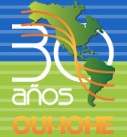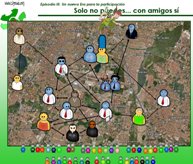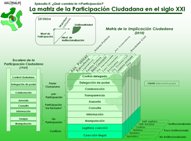Archive for the ‘Visions’ Category
 |
17. December 2010 – 17:25 by John Heaven (TuTech Innovation GmbH)
|
You’ve joined us for live chats on the blog, taken part in our online discourses, chatted to us at conferences, read PEP-NET members’ articles, and downloaded the free PEP-NET Issue of JEDEM. Eighty-six of you even came to Hamburg to join us for the PEP-NET Summit. Before the year is out, we would like to ask you take part in one final activity: our survey “Looking Forward, Looking Back: eParticipation Trends in 2010 and 2011.”
So what were the main trends in 2010? What areas of eParticipation made particular progress, and what events defined the eParticipation calendar? And while you are thinking about trends, what do you think will be up and coming in 2011? Nobody can predict the future, but it will be interesting to find out how 2010 was for friends of PEP-NET, and what they expect in 2011.
When I’m back in the New Year, I’ll put together a summary of results. I think it will make for interesting reading – but only if you take part, that is!
In the meantime, from Edinburgh to Athens, Madrid to Minsk: wherever you are, Merry Christmas and a Happy New Year!
Posted in members, Trends, Visions | No Comments »
 |
18. November 2010 – 10:32 by John Heaven (TuTech Innovation GmbH)
|

Manuel Kripp, MD of E-Voting.cc
Manuel Kripp, Managing Director of PEP-NET member E-Voting.cc, recently visited the US during the mid-term elections, so I was very curious to find out what he had got up to. We spoke about electronic voting machines, the role of social media in the US elections, and the need for change management when introducing E-Voting technology.
To find out what E-Voting.cc does, see their website or my previous interview with Manuel’s predecessor Robert Krimmer.
John Heaven: Hi Manuel. I hear you’ve been travelling recently. What were you up to?
Manuel Kripp: I was invited to participate in the 2010 U.S. election program organised by the International Foundation for Electoral Systems (IFES), and by the the Electoral Assistance Commission (EAC) to observe the election on Tuesday 2nd November.
The conference was well attended by experts from around the world, including Thomas Wilkie (Chief Executive, IFAS), Doug Chapin (Pew Centre on the States), and Bob Carey (Federal Voting Assistance Program). The Jo C. Baxter prize was presented to Dr Kwadwo Afari-Gyan, Chairman of Ghana’s Electoral Commission, for invaluable contributions to democracy in Ghana.
The focus of my visit was on seeing how elections are conducted in other countries from around the world, and comparing the US electoral system with how things are done in Europe.
Read the rest of this entry »
Posted in Interview, members, News, Trends, Visions | No Comments »
 |
16. November 2010 – 17:49 by Institute for Electronic Participation
|
 This year largest eDemocracy conference in South East Europe took place during 12-14th September, 2010 in Ohrid, Macedonia.
This year largest eDemocracy conference in South East Europe took place during 12-14th September, 2010 in Ohrid, Macedonia.
The e-Democracy Conference 2010 welcomed 30 delegations from 15 countries. 100 participants from Parliaments, Governments and Official Journals, as well as representatives from international organizations, business sector and academia were engaged in fruitful and interesting discussions about the role that ICT can play into improving the democracy and transparency of the public institutions. More information about the conference is available at https://www.edemocracy.mk.
The e-Democracy Conference 2010 topics included:
- Future and emerging technologies for e-Democracy
- Compliance and standards (EU perspective)
- How to support “Green IT” initiative in the policy development
- ICT in legislative knowledge management
- How can information technology transform the way parliaments and governments work
- Interoperability in the legislative process
- Parliaments and Democracy in the Twenty-first century
- State of ICT development in Parliaments
- ICT in parliaments current practices
- e-Parliaments-The Use of ICT to Improve Parliamentary Processes
The participants at the e-Democracy Conference 2010 agreed that the progress that Macedonia has made in using ICT for improving democracy is an example that all the countries in the region should follow.
Read the rest of this entry »
Posted in Events, good practice, inclusion, members, News, Tools, Trends, Visions | No Comments »
 |
16. November 2010 – 12:00 by John Heaven (TuTech Innovation GmbH)
|

Birmingham's Virtual Library. Click for larger image
It’s easy to reject Second Life as an eParticipation platform, but Birmingham City Council is just about to launch a virtual model of the planned £193m Library of Birmingham. I spoke to representatives of the Council and the company that they are working with to find out what they are doing, and how they are making the virtual library accessible to a wide audience. What I found was fascinating, and I really think Second Life deserves a second look.
Second Life is a virtual world that allows users to assume a second identity and explore a digital three-dimensional world. It’s not difficult to see how this could be used to enable people to “go” to places they wouldn’t otherwise visit, network with people from far away, or take part in virtual events. That’s the theory; but my big issue with Second Life is that it is a very niche audience and it takes quite a lot of effort to download the software and work out how to use it. Once you’re in there, it’s great to be able to look at these virtual buildings and access information; but I can view videos, read text, and chat to friends much more easily using the internet outside Second Life. So why would a city council be interested in Second Life? Read the rest of this entry »
Posted in good practice, Interview, News, Projects, Tools, Trends, Visions | 2 Comments »
 |
2. August 2010 – 23:16 by Asociacion Ciudades Kyosei / Pedro Prieto-Martin
|
[Once again, this post is specially aimed at people that are able to read in Spanish]
The  Asociación Ciudades Kyosei, in collaboration with the Inter-American Training Network on e-Government (which belongs to the prestigious Inter-American Organization for Higher Education), will soon host a virtual course titled “Citizen Participation and ICT: an experience of critical immersion in 21st Century’s Citizen Participation”.
Asociación Ciudades Kyosei, in collaboration with the Inter-American Training Network on e-Government (which belongs to the prestigious Inter-American Organization for Higher Education), will soon host a virtual course titled “Citizen Participation and ICT: an experience of critical immersion in 21st Century’s Citizen Participation”.
The course materials are written in Spanish, which will be the main language of instruction too; however, student’s contributions in English and Portuguese will also be fully welcomed.
The course is aimed at public sector’s technical staff, politicians, elected representatives, academics and members of civil society organizations whose work is linked with the design, implementation or execution of eParticipation/Participation projects and programs, or which have a special interested in Civic Participation and the possibilities offered by new communication technologies to strengthen it.
 By combining students with different professional backgrounds and geographical extractions, we intend to create groups that provide a rich and varied environment for learning.
By combining students with different professional backgrounds and geographical extractions, we intend to create groups that provide a rich and varied environment for learning.
Participants will thus not only acquire a solid and irreverent understanding of (e)Participation, but will also have the opportunity to reflect and exchange perspectives and experiences with people from different countries and cultures.
As part of the course practical assignments, they will also contribute to the collaborative design of the Kyosei-Polis system, a municipal (e)Participation environment that our Association is planning to build after the course.
The tutoring team is integrated by Pedro Prieto-Martín (Spain), Mariángela Petrizzo (Venezuela) and Antonio Alberto Teixeira (CE, Brazil).
 If you need any further information, you can consult the Course fact sheet (pdf, 5 pgs.) or even the Student Guide (pdf, 15 pgs.), which contains all relevant infos including detailed information about the course’s syllabus.
If you need any further information, you can consult the Course fact sheet (pdf, 5 pgs.) or even the Student Guide (pdf, 15 pgs.), which contains all relevant infos including detailed information about the course’s syllabus.
You can also write us with your questions at info@ckyosei.org.
The course will take place between the 13. of September and the 31. of October, lasting 7 weeks. The enrollment -which costs 150 US$- can be performed at the following registration page.
PS: I’ve been informed that 10 partial scholarships will be granted, where it is required (participation would thus cost just 75 US$). The form to apply for the scholarship is available here.
Posted in Events, ICT, Partners, Trends, Visions | 2 Comments »
 |
9. July 2010 – 16:11 by Dorothee Ruetschle (TuTech Innovation GmbH)
|

Photo by fRandi-Shooters on Flickr.com
Europas Netzwerk für ePartizipation PEP-NET – Pan European eParticipation Network – lädt am 23. September 2010 in die historische Speicherstadt der Freien und Hansestadt Hamburg ein. Im Mittelpunkt der von Richard Wilson, dem Begründer von Involve and izwe, moderierten eintägigen Veranstaltung steht das Thema Online-Bürgerbeteiligung – ePartizipation.
Beleuchtet werden insbesondere die Facetten
- ePartizipation in Europa: strategische Ziele vs. Umsetzung
- Die Zukunft der ePartizipation: regional, national und international
- Vorzeigeprojekte der ePartizipation: Berichte aus dem Praxisfeld
Die internationale Tagung ist für die Bedürfnisse von Vertretern aus Verwaltung, Wissenschaft, Wirtschaft und Bürgerorganisationen konzeptioniert. Gerade in Zeiten knapper Kassen stehen verschiedene Ausprägungen der ePartizipation, wie Bürgerhaushalte, die Beteiligung der Bürger an Gesetzgebungsverfahren, Open Data, Bürgerbeteiligung in der Politikfeldgestaltung, cooperative government und Transparenz bei Kommunen, Ländern und Nationen auf der Agenda. PEP-NET widmet sich der Förderung der ePartizipation und schafft mit der Veranstaltung eine besondere Plattform für einen intensiven Austausch, weiterführende Diskussionen und anregende Gespräche mit hochrangigen Persönlichkeiten.
PEP-NET freut sich besonders, die Teilnahme beitragsfrei anbieten zu können. Eine Anmeldung für die limitierte Veranstaltung ist ab sofort über die Online-Registrierung unter https://pep-net.eu/pep-net-summit/ möglich.
Der offizielle Hashtag für die Veranstaltung ist #PEPSUM
Posted in experince, good practice, open data, Projects, TuTech, Uncategorized, Visions | No Comments »
 |
7. June 2010 – 16:36 by John Heaven (TuTech Innovation GmbH)
|

Vienna Airport: free wifi
Everyone is talking about citizen-led service redesign these days, the idea that social media can allow citizens to design services and thus help the public sector meet their needs better whilst reducing waste. IDEA (the UK’s Improvement and Development Agency) is following up the publication of Local by Social, a guide to using social media to solve local problems, by teaming up with FutureGov to host an event bringing together local government officials and social innovators.
Hopping on a plane for a day is not quite the same as taking the train to Bristol, which seemed to happen at the drop of a hat when PEP-NET member Delib organised an event to plan the future of Britain’s deliberative democracy. Would this or something similar work on an EU level, and what are the specific issues it would face?
Whilst local authorities deliver hundreds of services on a local level, the EU is more distant. The ratio of citizens to staff is much higher, which makes that contact more difficult. The ever-present language barrier is a problem, as it always is when co-operating with other EU countries. Finally, the distance that you would have to travel to have face-to-face meetings is a lot larger. And worst of all, you’d have to meet in a café rather than a pub!
But the first question you would have to answer would be “What to design?”. One candidate is the European Citizens’ Initiative (or an online version of it), which is a provision in the Lisbon Treaty stipulating that if 1 million European citizens sign a petition, it has to be considered by the Commission. echo source started the ball rolling on this blog by raising some questions that need answering.
Then there is the Commission itself. It has made a commitment to demonstrate eGovernment as part of the Digital Agenda, and started a blog asking how it should use social media in its communications. How do citizens want the Commission to implement eGovernment in the coming years?
Or how about something new? Say, mini-grants for communities that want to twin themselves with communities in other countries and run a hyperlocal blog with an international touch, and a bit of money for cultural exchanges? As ever, ideas aren’t in short supply but it’s a matter of finding the best ones and putting them into practice. So it all comes down to cracking some of those problems I mentioned above.
Whatever you think of the EU, the freedom of movement, single currency and cheap transport between member states, added to access to online tools — brilliant at allowing collaboration over long distances — means that there was never a time when citizen-led service redesign on an EU level was more possible!
Posted in Trends, Uncategorized, Visions | No Comments »
 |
21. May 2010 – 10:08 by Bengt Feil (TuTech Innovation GmbH)
|
Two of the  major challenges for eParticipation today are scale (what to do if there are 100.000 contributions) and the problem of quantifying the positions in qualitative discussions (clearly knowing who supports what etc.). Automatic analysis and categorization of contributions could be a possible solution to these problems or at least a valuable support to human moderators and facilitators. The challenge of reliable automatic argument analysis has not been solved yet and a perfect solution might be out of reach for a long time, but with the announcement of the data prediction API at the Google I/O conference yesterday a workable solution could be available soon.
major challenges for eParticipation today are scale (what to do if there are 100.000 contributions) and the problem of quantifying the positions in qualitative discussions (clearly knowing who supports what etc.). Automatic analysis and categorization of contributions could be a possible solution to these problems or at least a valuable support to human moderators and facilitators. The challenge of reliable automatic argument analysis has not been solved yet and a perfect solution might be out of reach for a long time, but with the announcement of the data prediction API at the Google I/O conference yesterday a workable solution could be available soon.
The data prediction API is a service that is able to categorize random text based on how it has been trained with known categorized data. For example: If the service was trained that “This is an english sentence” is “English” and that “La idioma mas fina” is “Spanish” it will be able to determine that “Qué Hay De Nuevo” is also “Spanish”. Of course this is a very simple example but the service is potentially able to categorize complex texts based on the training it has received with known data. Details about the process can be found in the developers guide (warning technical content). Read the rest of this entry »
Posted in Tools, Visions | No Comments »
 |
19. May 2010 – 13:36 by echo source
|
As the European Citizens Initiative (ECI) has now come to the phase of its final shaping, we now have the chance to contribute to its success in being a tool for true citizens participation in European politics. However, current discussions on the regulations drafted by the Commission do show some confusion about what this legislative instrument actually can provide and which risks it contains.
Generally ECI is understood as an instrument for decision-making or voting, as we know it from direct democratic instruments like referenda. Thus, the main use of ICT for the ECI is seen in the authentication and collection of votes (e-voting).
But in fact ECI is not essentially a means for decision-making. Its legal consequences are limited to submission of proposals to the Commission, which in turn is not even obligated to pass this proposal to the parliament. Thus, ECI does only allow citizens to participate in political agenda setting and rather has to be understood as a process of collective opinion formation. Accordingly, current discussions on authentication and representativeness miss to address the crucial questions at stake, because ECI is not comparable to an election or referendum.
However, this does not mean that ECI is not worth anything. As an instrument for participatory agenda setting, ECI does offer citizens an opportunity to deliberate on questions, which they feel concerned about and to proactively bring them on the political agenda. ECI could open a space for trans-cultural, trans-border discourse embracing all the different viewpoints Europeans from various member states may have, and thus, has the potential to establish a European public sphere. It is about creating a process of discursive appropriation of Europe by its citizens, making them co-authors of the European endeavour.
Thus, ECI must be understood much more as a participatory process, requiring an intelligent and consistent combination of offline and online methods for constructive collaboration at local, national and European level.
Furthermore, to prevent ECI from being misunderstood as a mere oppositional instruments, it will be equally important to guarantee a synergic interplay between civil organizations and governmental institutions.
Therefore, further concretion and development of ECI must focus much more on the participative process of collective opinion formation and deliberative agenda setting.
Accordingly, the role of ICT in these processes has to be reconsidered. We will not only need e-voting systems and virtual IDs, but also powerful tools for cross-language dialogue, structured debate, collective co-creation of proposals and position papers as well as tools for effective e-campaigning and proactive self-organization.
Posted in Debate Europe, News, Visions | 3 Comments »
 |
19. May 2010 – 10:33 by Bengt Feil (TuTech Innovation GmbH)
|

by HubSpot on flickr.com
Over the course of the last weeks and months the discussion about privacy on Facebook and other social networks has become ever more intense and heated. A quick look on Google news for example reveals more than 4.000 news articles about this issue. One of the initiators for this debate was decision by Facebook to (again) change its approach to privacy by making more information about its users public by default. If you would like to get a feeling about the level of publicity Facebook profiles have reached just take a quick look at youropenbook.org (a search engine for all public status updates) or reclaimprivacy.org (a tool that allows you to scan your privacy settings and show you what is public).
In this climate of rising distrust towards Facebook many digerati and web users have stated the need for an alternative social networking infrastructure that allows for more control by the user without making the management of your online privacy to complicated.
Read the rest of this entry »
Posted in Trends, Visions | No Comments »





 If you need any further information, you can consult the
If you need any further information, you can consult the 

 major challenges for eParticipation today are scale (what to do if there are 100.000 contributions) and the problem of quantifying the positions in qualitative discussions (clearly knowing who supports what etc.). Automatic analysis and categorization of contributions could be a possible solution to these problems or at least a valuable support to human moderators and facilitators. The challenge of reliable automatic argument analysis has not been solved yet and a perfect solution might be out of reach for a long time, but with the announcement of the
major challenges for eParticipation today are scale (what to do if there are 100.000 contributions) and the problem of quantifying the positions in qualitative discussions (clearly knowing who supports what etc.). Automatic analysis and categorization of contributions could be a possible solution to these problems or at least a valuable support to human moderators and facilitators. The challenge of reliable automatic argument analysis has not been solved yet and a perfect solution might be out of reach for a long time, but with the announcement of the 






